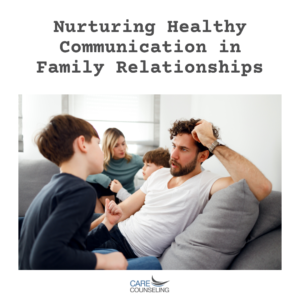Nurturing Healthy Communication in Family Relationships
 Communication is the cornerstone of healthy family relationships. It is the bridge that connects each member, enabling them to understand, support, and connect with one another. Effective communication within the family is not just a tool; it’s a vital necessity for building trust, resolving conflicts, and strengthening the bonds that tie families together.
Communication is the cornerstone of healthy family relationships. It is the bridge that connects each member, enabling them to understand, support, and connect with one another. Effective communication within the family is not just a tool; it’s a vital necessity for building trust, resolving conflicts, and strengthening the bonds that tie families together.
Why Healthy Communication Matters in Families
Healthy communication in family relationships serves several critical purposes:
- Understanding and Empathy: Effective communication allows family members to express their thoughts, feelings, and needs. It promotes empathy and understanding by enabling everyone to see things from different perspectives.
- Conflict Resolution: When disagreements or conflicts arise, open and honest communication can help family members find common ground and resolve issues peacefully.
- Strengthening Bonds: Communication fosters emotional connections and helps family members feel more connected and supported.
- Teaching Life Skills: Effective communication is a skill that children can carry into adulthood, impacting their personal and professional lives.
- Building Trust: Trust is the foundation of any healthy relationship. Open communication is vital in establishing and maintaining trust within the family.
Tips for Nurturing Healthy Communication
- Active Listening: Encourage active listening by teaching family members to focus on the speaker without interrupting. This means making eye contact, nodding to show understanding, and asking questions for clarification.
- Share and Express: Promote a culture of open expression. Encourage family members to share their thoughts, emotions, and experiences without fear of judgment or criticism.
- Set Aside Quality Time: In today’s fast-paced world, it’s essential to allocate quality time for family discussions. Create a regular schedule for family meetings or bonding activities that allow for open conversations.
- Use “I” Statements: Teach family members to use “I” statements when expressing their feelings or concerns. For example, “I feel hurt when…” instead of “You always…”
- Practice Patience: Be patient with each other, especially during difficult conversations or conflicts. Remember that understanding may take time, and it’s okay to agree to disagree.
- Avoid Blame and Criticism: Encourage a blame-free and criticism-free environment. Teach family members to express their concerns without assigning blame. This reduces defensiveness and paves the way for effective problem-solving.
- Conflict Resolution Skills: Teach conflict resolution skills, such as active listening, brainstorming, and compromising. Ensure that all family members understand that it’s okay to disagree, but it’s essential to find a mutually satisfactory solution.
- Set Boundaries: Clearly define boundaries within the family, ensuring that personal space and privacy are respected. This fosters a sense of safety, which is essential for open communication.
- Celebrate Achievements: Acknowledge and celebrate each family member’s achievements and milestones. Positive feedback and encouragement build self-esteem and promote open communication.
- Digital Detox: In the age of smartphones and tablets, it’s essential to establish screen-free zones and times. Encourage family members to put away their devices during meals and family discussions to promote in-person communication.
- Lead by Example: Parents and caregivers play a pivotal role in modeling healthy communication. Children often mirror the communication styles they observe in adults.
- Admit Mistakes: Be open about your mistakes and admit when you’re wrong. This not only teaches humility but also shows family members that it’s okay to make mistakes and learn from them.
- Seek Professional Help if Needed: In cases of chronic communication issues or severe conflicts, consider seeking the assistance of a family therapist or counselor. They can provide guidance and tools to help your family improve its communication.
The Long-Term Benefits of Healthy Communication
Nurturing healthy communication in family relationships is an ongoing process with significant long-term benefits. By fostering effective communication within your family, you can:
- Build Stronger Relationships: Healthy communication strengthens the bonds between family members, creating a more united and supportive family unit.
- Enhance Emotional Well-being: Open communication reduces stress and promotes emotional well-being for all family members.
- Improve Conflict Resolution: Effective communication equips family members with the skills needed to resolve conflicts peacefully and constructively.
- Promote Trust and Security: Trust and a sense of security are the foundation of strong family relationships. Healthy communication is a key factor in establishing and maintaining these crucial elements.
- Prepare Children for Life: Teaching children effective communication skills at a young age equips them with essential tools for success in their personal and professional lives.
- Create Lasting Memories: Family discussions and bonding activities foster a culture of understanding and shared experiences, creating lasting memories for all.
By promoting active listening, open expression, patience, and problem-solving, you can create an environment where family members feel valued, understood, and connected. The long-term benefits of healthy communication are immeasurable, impacting not only the family unit but also the individual well-being of each family member.



























